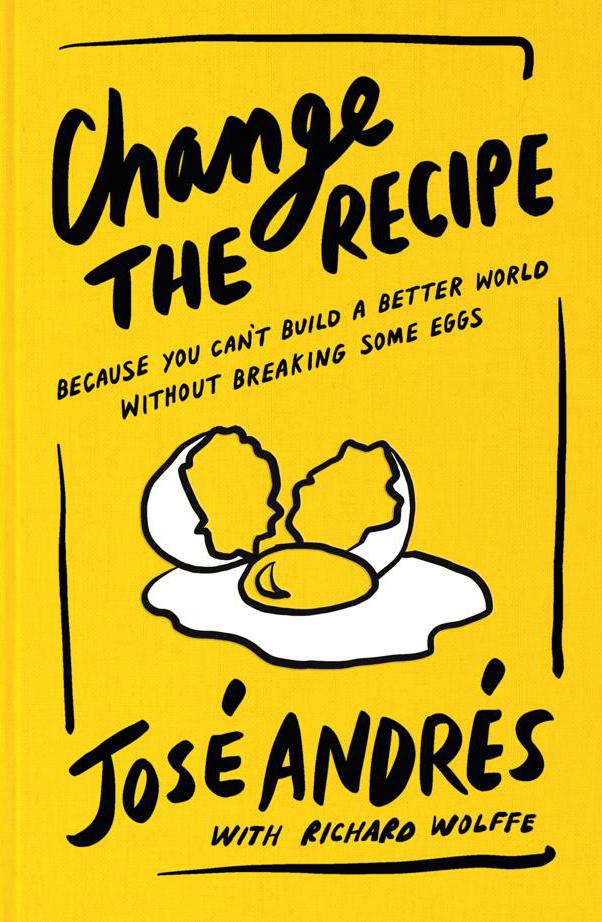
In a new book, Spanish-American chef and restaurateur José Andrés, known internationally for humanitarian work and disaster relief with his nonprofit World Central Kitchen, tells a story about his mother at the stove in their home in Barcelona. She’s heating garlic in oil in a terra-cotta pot. As the garlic gets hot and dances in the pan, she dances, too. Then she tosses in red peppers that she has charred, peeled, and torn up, adds a little water, lets it boil down into a sauce, and sprinkles in sherry vinegar.
“We could eat those peppers on top of a slice of toast, or maybe next to some fried eggs. They were simple and yummy, like candy. They tasted like love.’’ The scene is described in “Change the Recipe: Because You Can’t Build a Better World Without Breaking Some Eggs’’ (Ecco, $26.99), written with Richard Wolffe. Andrés admits that he wanted to cook from an early age.
He explains that the title of the book comes from learning early on not to “let bad moments bring you down.’’ Adapt, he writes, as he has had to do often in the kitchen, when an ingredient is missing, when carelessness sends cooked food flying to the floor, when he’s in a war zone and people are going hungry. “To make a Spanish tortilla,’’ he writes, “you need to break some eggs. To fix the broken parts of our world, you often need to break the rules.’’
The book consists of memoir-ish essays that tell stories of Andrés’s early cooking jobs, a stint in the Spanish navy that took him to America for the first time, what it was like to work at El Bulli under chef Ferran Adrià, coming to this country in 1991 to cook, and settling in Washington, D.C., where he earned Michelin stars, and opened 30 establishments in the nation’s capital and across the country.
Andrés seems to draw on boundless energy. He joined his restaurant partner, Rob Wilder, in the nonprofit organization DC Central Kitchen, which fed the homeless and trained people for restaurant work. World Central Kitchen evolved out of that experience. The organization has served 400 million meals in natural disasters and conflict zones.
It began in Haiti after the 2010 earthquake and right away he learned an important lesson from local women who had set up a shelter and were cooking. Andrés made a pot of black beans and rice. He and the women didn’t have a common language but he saw they didn’t like what he made. They showed him how it should be done. They took burlap sacks and used them to sieve the black beans into a saucy puree. “It ended up so beautiful and rich and velvety, this perfect texture that I had never seen before from beans.’’
If he was going to do this, he would have to listen to the residents where he was. “I still have trouble listening sometimes,’’ he writes, “I love thinking I’m right. I love to be the one who is telling people what to do.’’
He set up shop at more natural disasters, and most recently in Ukraine, Israel, and Gaza.

Wherever he is, writes Andrés, he has “to be ready for the loud voices that will line up against you.’’ He was accused of profiting from Hurricane Maria in Puerto Rico, “when the truth is,’’ he writes, “that I don’t earn a penny for my work in disasters.’’
When people in other organizations, far from the crisis, try to tell him what to do, the only expert he’s interested in talking to is someone with boots on the ground. An MBA thousands of miles away, he says, doesn’t have more knowledge of the situation than “a guy with a bulldozer who is building a jetty in Gaza out of concrete rubble.’’
In April 2024, seven World Central Kitchen workers in Gaza were killed by Israeli air strikes that hit their convoy. He ends the book with a tribute he gave to them at a memorial service at Washington National Cathedral.
“Change the Recipe’’ touches on many of the deep issues our society and what people have to contend with. You can imagine that someone like Andrés can tackle some of this.
But the book has a TED talk quality, with each chapter ending in a go-get-‘em motivational summary of how to handle, overcome, rise above (fill in the blank) various situations.
In January 2024, several members of Congress nominated Andrés for a Nobel Peace Prize.
The modest author never mentions it.
Sheryl Julian can be reached at sheryl.julian@globe.com.

